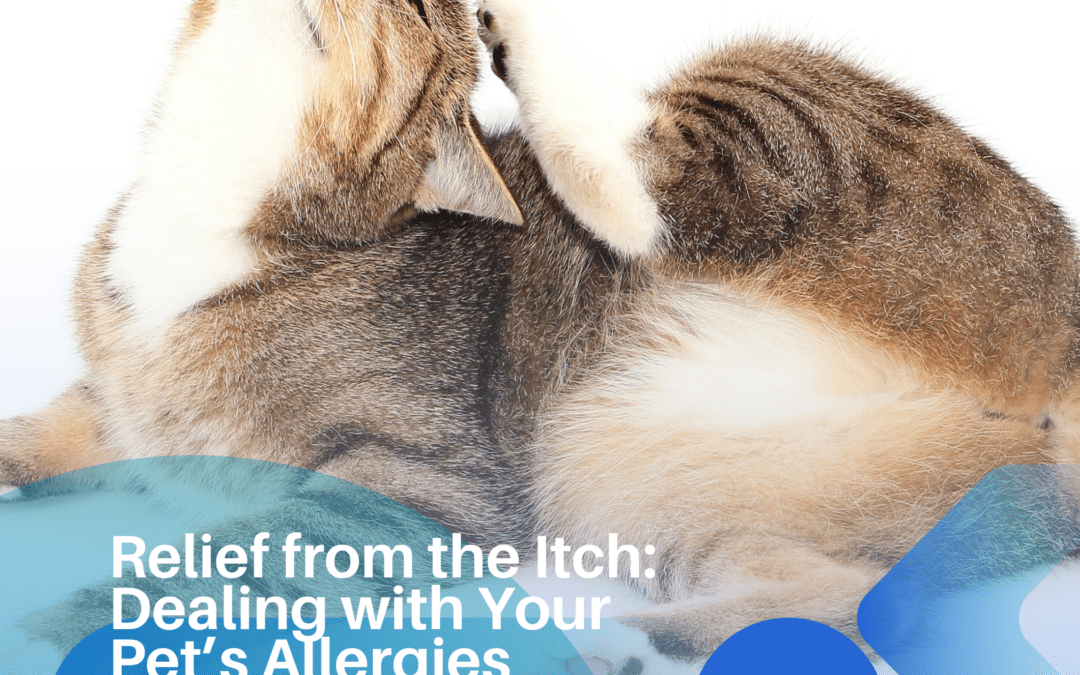August is “Itchy Dog Awareness Month”, making it the perfect time to talk about something many pet owners face – pet allergies. Whether your furry friend is dealing with the constant need to scratch, lick or bite, has gastrointestinal symptoms or any combination of these, it is distressing to see them uncomfortable. Determining when to see the veterinarian can be difficult. In this blog post, we will discuss common causes of itchiness in dogs, when you should seek veterinary care, and tips to keep your dog itch-free and happy.
Common Causes of Itchiness in Dogs
Dogs and cats will scratch, lick, or nibble at their skin for various reasons. While occasional scratching is normal, persistent itchiness can indicate an underlying problem. The most common causes are allergens that cause inflammation in the skin which results in the desire to scratch.
Our pets can suffer from allergies just like us humans. Allergies can be triggered by:
- Environmental allergens: Pollen, mold, dust mites, and grass can cause seasonal or year-round itchiness.
- Food allergies: Some dogs may react to specific ingredients in their food, such as beef, chicken, or grains. The most common food allergen is protein, NOT grains, despite the hype behind grain-free diets.
- Flea & mite allergies: Even one single flea bite can trigger a severe reaction in pets known as Flea Allergy Dermatitis (FAD). This usually results in a scabby, itchy rash on or near the hind-quarters, but can occur all over the body. Fleas, ticks, mites, and other parasites can irritate your dog’s skin, leading to intense scratching. Flea infestations are common, especially during warmer months, but even if you don’t see them, they could be hiding in your pet’s fur.
When your pet scratches, abrasion to the skin allows bacteria or yeast to enter & grow. For this reason, bacterial &/or yeast infection are common in areas where your pet has been scratching or licking excessively. Red, inflamed, or flaky skin may be signs of an infection that requires treatment. You should also seek treatment if you notice bumps, especially pustules.
You should never assume that itching is allergy related. Sometimes, itchiness & coat changes are a symptom of a more significant health issues like hormonal imbalances, thyroid conditions, autoimmune diseases, or even cancer.
It’s important to monitor your pet’s behavior and note when their scratching, licking or biting becomes a cause for concern. Here are some signs it’s time to consult a veterinarian:
1. Constant Scratching, Licking, or Biting
If your pet is constantly trying to scratch, bite, or lick a specific area, it is more than just an occasional itch. Excessive itching could lead to wounds, infections, and hair loss.
2. Red, Inflamed, or Bleeding Skin
Any signs of irritation, especially if the skin is red, swollen, or bleeding, warrant a vet visit. This could indicate an infection, allergic reaction, or parasite infestation.
3. Hair Loss & Scabs
If your pet is losing fur in specific areas or developing bald patches, has scabs or has an active rash, this could be a sign of an infection, or even a more severe condition.
- Food Safety: Keep pets away from the BBQ and picnic areas. Foods like chocolate, grapes, onions, and fatty meats can be toxic to pets
- Safe Environment: Ensure your pet has a quiet space to retreat if they become overwhelmed by the noise and activity
- Be sure to follow the heat and firework safety tips provided, too
4. Foul Odor from Skin or Ears
If your pet’s skin or ears emit an unpleasant smell, it could be due to an infection. Many compare this smell to cheesy smell. Ear infections, often caused by yeast, are common in dogs with allergies and can cause significant discomfort. While less prone to allergic ear infections, cats can also develop yeast or bacterial infections in their ears.
5. General Discomfort or Restlessness
If your pet seems uncomfortable, restless, or is having trouble sleeping due to itching, it is time to ask for professional advice.
What to Expect at the Vet
When you bring your itchy dog to see us at Charm City Vet, we will first perform a thorough examination to identify the cause of the itchiness. This might include:
- Ear &/or Skin Cytology to identify any bacterium present.
- Food Trials to determine if a food allergen is causing your pet’s discomfort.
- Blood Testing to rule out underlying health conditions.
- Prescription Meds or Injections to manage symptoms or infections.
- Topicals or Shampoo to aid in healing of damaged skin.
- Flea Prevention because a single flea bite can cause an allergic reaction.
Call us today to schedule an appointment if you need help managing your pet’s itchiness. We are accepting new clients & we are happy to help!

